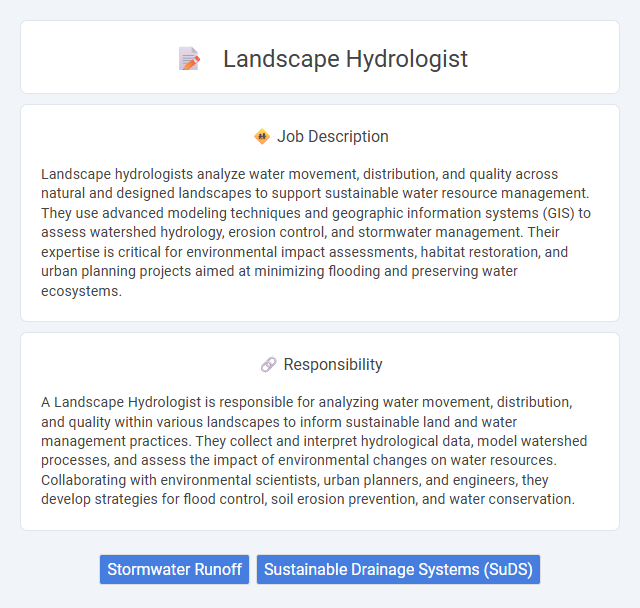
Landscape hydrologists analyze water movement, distribution, and quality across natural and designed landscapes to support sustainable water resource management. They use advanced modeling techniques and geographic information systems (GIS) to assess watershed hydrology, erosion control, and stormwater management. Their expertise is critical for environmental impact assessments, habitat restoration, and urban planning projects aimed at minimizing flooding and preserving water ecosystems.
Individuals with strong analytical skills and a passion for environmental science are likely suitable for a career as a Landscape Hydrologist. Those comfortable working in outdoor settings and handling complex data related to water flow and land processes probably find this job fulfilling. However, people who prefer routine tasks or minimal fieldwork might not align well with the dynamic and investigative nature of this role.
Qualification
A Landscape Hydrologist typically requires a bachelor's degree in hydrology, environmental science, geology, or a related field, with many positions favoring advanced degrees such as a master's or PhD. Proficiency in Geographic Information Systems (GIS), remote sensing, and hydrological modeling software is essential for analyzing water movement and landscape interactions. Relevant certifications, such as Certified Hydrologist (CH) or Professional Hydrologist (PH), and practical experience in watershed management, soil science, and environmental impact assessment significantly enhance job prospects.
Responsibility
A Landscape Hydrologist is responsible for analyzing water movement, distribution, and quality within various landscapes to inform sustainable land and water management practices. They collect and interpret hydrological data, model watershed processes, and assess the impact of environmental changes on water resources. Collaborating with environmental scientists, urban planners, and engineers, they develop strategies for flood control, soil erosion prevention, and water conservation.
Benefit
A career as a landscape hydrologist likely offers significant benefits in environmental impact and resource management, enhancing sustainable water use and erosion control. Professionals in this field probably enjoy opportunities to work on diverse projects in natural and urban landscapes, contributing to climate resilience and ecosystem health. Job prospects may include collaboration with government agencies, environmental firms, and research institutions, providing professional growth and knowledge advancement.
Challenge
A Landscape Hydrologist is likely to face the challenge of accurately predicting water flow and distribution in complex terrains, which often involves integrating diverse data sources and dealing with climate variability. There is a probable difficulty in balancing ecological preservation with human water resource demands within changing landscapes. Managing uncertainties in hydrological models and the impact of land-use changes may also pose significant obstacles in this role.
Career Advancement
Landscape hydrologists specialize in evaluating water movement within various terrains, providing crucial insights for environmental planning and management. Career advancement often involves gaining expertise in Geographic Information Systems (GIS), remote sensing, and hydrological modeling to lead complex projects or advance into senior research or consultant roles. Opportunities also expand into academia, policy advising, and roles with government agencies or environmental firms focused on sustainable water resource management.
Key Terms
Stormwater Runoff
Landscape hydrologists specializing in stormwater runoff analyze the movement and distribution of water across terrestrial environments to mitigate flooding and erosion. They develop sustainable drainage systems and green infrastructure solutions that enhance water infiltration and reduce pollutant loads in urban and rural landscapes. Proficiency in hydrological modeling software and knowledge of local watershed management practices are essential for optimizing stormwater control measures.
Sustainable Drainage Systems (SuDS)
Landscape Hydrologists specialize in designing and implementing Sustainable Drainage Systems (SuDS) to manage surface water runoff effectively, reduce flood risks, and improve water quality in urban and rural environments. They apply hydrological modeling and soil analysis to develop natural drainage solutions that mimic pre-development water cycles, enhancing biodiversity and promoting groundwater recharge. Expertise in SuDS includes integrating permeable pavements, detention basins, green roofs, and swales to optimize stormwater management within landscape architecture and urban planning projects.
 kuljobs.com
kuljobs.com